How to play MPC files
 This article shows how to play audio files you may have retrieved on the Internet with a .MPC extension. It covers several options including a fast solution (just download and play) and a more eloquent solution (setting up your PC to play MPC files more easily, using Windows Media Player and other common multimedia applications).
This article shows how to play audio files you may have retrieved on the Internet with a .MPC extension. It covers several options including a fast solution (just download and play) and a more eloquent solution (setting up your PC to play MPC files more easily, using Windows Media Player and other common multimedia applications).What is Musepack?
An audio file with the extension .MPC generally contains audio information created with the Musepack codec. It is a lossy compression format like MP3, meaning that it does cut out parts of the audio data that cannot be fully retrieved again later to save space. It was originally based on the MP2 audio format (had an earlier name of MPEGPlus) but several aspects have separated the two since.
The quality of Musepack, like OGG Vorbis, has often been touted as better than that provided by the more common MP3 format. This article will now show you several options, including several players and tweaks, to get your Musepack audio files playing on your computer.
Easiest Method - VideoLAN Client for Windows, MAC and Linux
 With the VLC player, you can enjoy your Musepack audio files quickly. The player directly supports Musepack without the need for DirectShow filters or special codecs to be installed. If you are looking for a quick solution then this is certainly it, but if you want to look at other examples of these players or learn to play with Windows Media Player and store it in your Media Library, then read on.
With the VLC player, you can enjoy your Musepack audio files quickly. The player directly supports Musepack without the need for DirectShow filters or special codecs to be installed. If you are looking for a quick solution then this is certainly it, but if you want to look at other examples of these players or learn to play with Windows Media Player and store it in your Media Library, then read on.
You can get VLC for Windows from this URL.
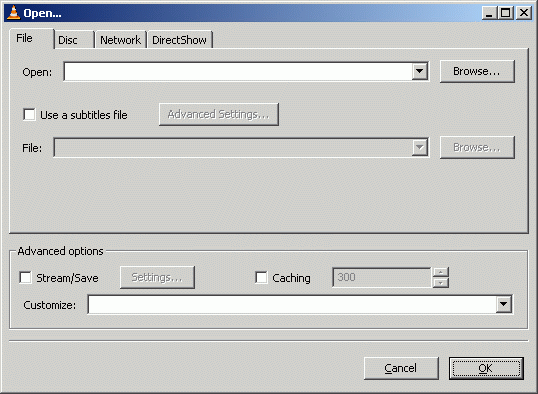 Click File and click the Open File option.
Click File and click the Open File option.Now, click the Browse button next to the first white line at the top of the window with title "Open.." and navigate through your harddrive for the MPC file you wish to listen to and select it. After you have selected the file, click OK and VLC will start playing the MPC audio you chose.
For other Operating Systems...
Mac: http://www.afterdawn.com/software/alternative_platforms/mac_software/vlc_for_mac.cfm
Linux: http://www.afterdawn.com/software/video_software/video_players/vlc_linux.cfm
Foobar 2000 supports MPC directly
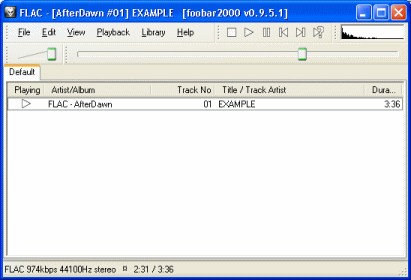 One of the most excellent audio players and converters available is Foobar 2000. It is available as a free download from AfterDawn and it natively supports the Musepack (MPC) format. It also will allow you to easily convert it to another format or edit the tag information.
One of the most excellent audio players and converters available is Foobar 2000. It is available as a free download from AfterDawn and it natively supports the Musepack (MPC) format. It also will allow you to easily convert it to another format or edit the tag information.Download Foobar 2000 from AfterDawn at: http://www.afterdawn.com/software/audio_software/audio_players/foobar2000.cfm
Play in DirectShow players such as Windows Media Player?
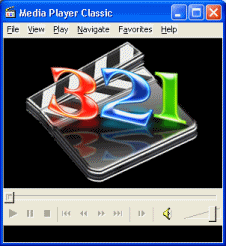 It is totally possible to play MPC files in Windows Media Player and technically any DirectShow-based player. Before we look at Windows Media Player directly, let's take a look at Media Player Classic because with Windows Media Player we will also need to install a plug-in to read the MPC metadata correctly.
It is totally possible to play MPC files in Windows Media Player and technically any DirectShow-based player. Before we look at Windows Media Player directly, let's take a look at Media Player Classic because with Windows Media Player we will also need to install a plug-in to read the MPC metadata correctly.
The first thing we need is a DirectShow filter, and there is a perfectly good one available called Radlight MPC DirectShow filter.
Download it from:
http://www.afterdawn.com/...
Download Media Player Classic from:
http://www.afterdawn.com/software/video_software/video_players/media_player_classic.cfm
Install RadLight MPC DirectShow Filter
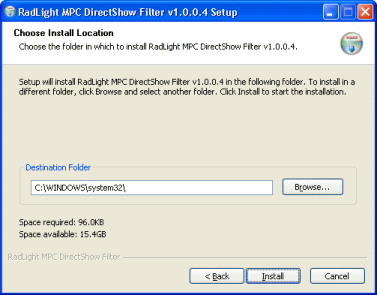 When you download the RadLight MPC DirectShow Filter, run the installer. It is a simple installer, tick the box immediately to accept the agreements and click Next until it is finished.
When you download the RadLight MPC DirectShow Filter, run the installer. It is a simple installer, tick the box immediately to accept the agreements and click Next until it is finished.
This will install the files necessary to make MPC files work in DirectShow-based players, which include Media Player Classic and Windows Media Player. Test out an MPC file.
There is one more step to perform however. Windows Media Player cannot directly support the Musepack metadata (information on the tracks) and so the WMP Tag Support Extender must be installed.
Download WMP Tag Support Extender from:
http://www.afterdawn.com/...
Install WMP Tag Support Extender
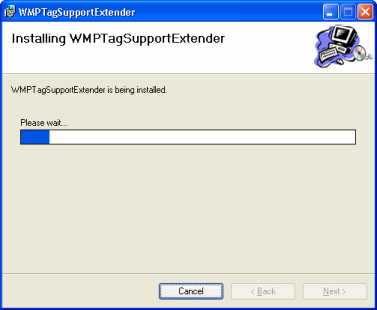 When you have downloaded WMP Tag Support Extender, run the installer. It is just a basic install and requires you to just clicking Next until it is complete, at which time, you can click Close.
When you have downloaded WMP Tag Support Extender, run the installer. It is just a basic install and requires you to just clicking Next until it is complete, at which time, you can click Close.
Now we must configure Windows Media Player to use this add-on.
WMP Tag Support Extender - 1
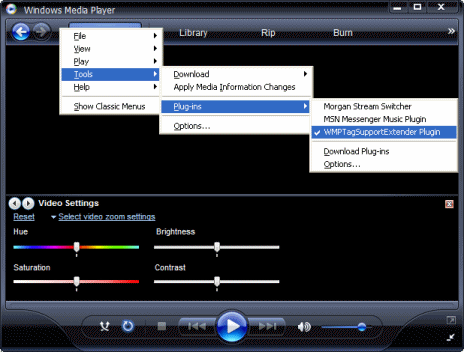 Open Windows Media Player. If you do not have the latest Windows Media Player, this might not work.
Open Windows Media Player. If you do not have the latest Windows Media Player, this might not work.
Download Windows Media Player by clicking here.
Now open Windows Media Player and you should see something similar to the picture located to the right of this text (clicking will enlarge). Right-click somewhere on the top bar (I have right-clicked beside the Now Playing button) and scroll your pointer down to Tools --> Plug-ins --> WMPTagSupportExtender Plugin. This usually is already selected.
Make sure that there is a tick beside this plug-in or else Windows Media Player won't use it while playing MPC audio. Now there is another bit of configuring to do. Again, right click in the same spot, navigate to Tools --> Plug-ins --> Options and left-click on Options. This will open Windows Media Player Options in the Plug-in tab.
WMP Tag Support Extender - 2
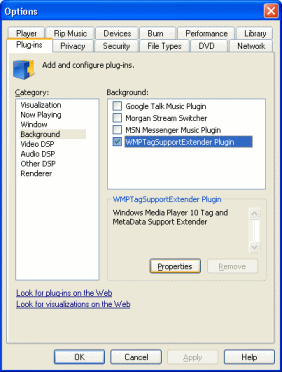 In the Plug-in tab in options you will see a list underneath Category. As you can see in my picture (click to enlarge) you need to click Background. Now from the list that appears on the right, click on WMPTagSupportExtender (don't untick the box, click the text) and then move the mouse below to the Properties button and click it. This will now open a new window.
In the Plug-in tab in options you will see a list underneath Category. As you can see in my picture (click to enlarge) you need to click Background. Now from the list that appears on the right, click on WMPTagSupportExtender (don't untick the box, click the text) and then move the mouse below to the Properties button and click it. This will now open a new window.WMP Tag Support Extender - 3
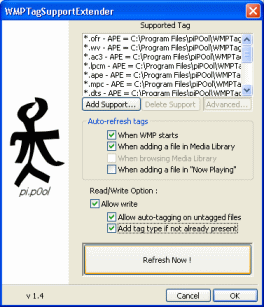 Now as you can see in my picture (click to enlarge), a new Window will pop-up with settings for WMP Tag Support Extender. From here you can change some of the Read/Write options for tags. I recommend selecting "Allow Write" and then selecting both the options available to you below it.
Now as you can see in my picture (click to enlarge), a new Window will pop-up with settings for WMP Tag Support Extender. From here you can change some of the Read/Write options for tags. I recommend selecting "Allow Write" and then selecting both the options available to you below it.
Once you are done, click "Refresh Now" to refresh your library, then click OK. This should now work.
Note: We have had trouble getting tags to work with the latest version of Windows Media Player 11, even trying the register DLL workaround. Hopefully an update will fix this.
Finally
Hopefully after reading this guide your Musepack files now work flawlessly. If you need extra help, please visit our Discussion Forums for assistance.
Version History
v1.0 - First published by Dela (08/05/2008
